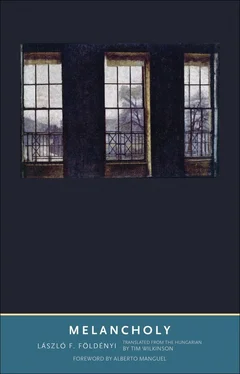An admitted weakness is an actual weakness — this needs to be laid down before juggling with concepts drives it out of our minds. In the present case, this is true on many counts. Melancholia is, among other things, a consequence of the inadequacy of concepts; that inadequacy, however, is not some kind of deficiency that can be overcome or even eliminated over time, but the sort of thing without which concept formation is unimaginable, and just as clear-sightedness, measure, or definitiveness forms one of the pillars on which all insight can rest, so obscurity, gloom, incomprehensibility, and dissatisfaction form the other. Hence, perhaps, the sadness that lurks in the depths of any formulation laying claim to finality, the inconsolability that corrodes even the most closed formations. Our culture is more than happy to apply here the concept of negativity or absence, but — and of this too it is melancholia that serves us as a reminder — can we consider negativity or lack something that cannot be eliminated from human existence? Maybe one can from a kind of eschatological point of view, but — and melancholia reminds us of this as well — if eschatological faith itself is one of the manifestations of fragile human existence, then are we in the position to pass judgment, in divine fashion, drawing strict boundaries between negativity and positivity? Ultimate points and extreme boundaries do exist; this is shown not only by our finiteness, manifested in our evanescence and mortality, but also by the limits against which, sooner or later, all human endeavors come up. These ultimate human boundaries and possibilities do not encircle and embrace us from the outside, however, but rather are the most characteristic, internal foci of existence, which one may encounter anywhere, at any time. That is why what seems to be a lack from the outside (the fact that human existence is limited, not almighty) appears from the inside as fulfillment; what, from a divine perspective, seems a frailty is by human standards an internal strength and competence. Inconsolability is there even in profound perspicacity; obtuseness in the most explicit train of thought. That does not mean, however, that they extinguish each other. We live our entire lives in separate, incomparable, unique ways, and so there are no two persons with an equal share of obtuseness and perspicacity, of a desire for the boundless, and of an existence doomed to ultimate frailty. And (melancholia here warns us again) that is a precondition of life, but also of death. We do not die of weakness or strength, perspicacity or obtuseness, but of the fact that each is a lack of the other and a fulfillment of itself.
Yes, melancholia warns us time and time again; yet the beckoning does not come from outside but speaks to us from inside. It does not necessarily have any need of words, however. It is simultaneously present on this side of words and beyond them. It gives birth to words that in the end will empty it. A few centuries BCE, when mention was first made of it, the pangs that had accompanied the birth not just of melancholia but also of humankind itself had already fallen into oblivion. Melancholia stands before us in full armor (though that image is very misleading), and the words that are articulated about it are mostly descriptive and objective. Later on, as words multiplied, a time would come when the words uttered about it created melancholia, when people endeavored to become melancholic by conversing at length about it, though such a fashion had little to do with melancholia itself. Since those words, as oral expressions in general, are attended by ultimate ignorance and error, speaking about melancholia is a particularly hair-raising undertaking. It is necessary that words have a delicate balance: one must speak not only of what the subject of the conversation is but also of how the conversation proceeds. This, however, is an endless spiral: one must create words about the how , treated as a subject, in some form, and that form also requires that it is treated as a subject. There is no final resolution in the torrent of subject and form that grind up and erode each other: we are talking about melancholia, yet we should be talking about the melancholic foundation of words. We are trying to pull ourselves up by our own bootstraps.
When melancholia made its first appearance as a concept, everything that might be said was said about it. From the very beginning, however, the “elusiveness” of the concept was conspicuous, and later ages were unable to alter that. No unequivocal, accurate definition of melancholia exists. The history of melancholia is an ever-inconclusive history of approximating concepts of acceptable accuracy, and that is why a doubt arises: in talking about melancholia, our true subject is not melancholia; rather, we are actually trying to assess our own places, with the assistance of the concepts that have been formed about it. That is why the anguish of beginning is manifold. First of all, where do we really begin? At the point where our theme first comes into sight as a concept (in antiquity), or at the point where our own lives latched on to the concept, being unable thereafter ever to rid ourselves of it? At the point where it dons the form of a word, or where, in backing away from words, our life reaches it all the same? We said that when mention was first made of it, it already stood before us in full armor. Caution and perhaps the fear that is at work at the bottom of all caution demand that one should start with the word and track the fate of the concept. If, as is supposed, melancholia lurks at the very back of concept formation, corroding words and belying concepts, then we shall be able to formulate more clearly the questions and doubts of our own lives, even if by doing so we won’t have all the answers.



“Why is it that all those who have become eminent in philosophy or politics or poetry or the arts are clearly of an atrabilious temperament [i.e., melancholic]?” The opening line (953a) of book 30 of the so-called Problemata physica , ascribed to the Aristotelian school, is compelling enough to stand at the head of our line of thought. It has lost none of its validity down to the present day. Since the book contains, besides undisputed Aristotelian texts, material from other sources and authors as well, it is not impossible that the thought cited stems from the pen of Theophrastus, who, according to Diogenes Laertius, wrote the first (now lost) book about melancholia. All the same, let us stay with the assumption that Aristotle is the author. It is here that the concepts of excellence and extraordinariness are first associated with melancholia, which may be surprising at first sight. Melancholia, to use the word in its original, literal meaning of “black bile” or atra bilis (  ), is a quality of the body, whereas the excellence of a philosopher, politician, or artist is that of the mind, and in accordance with the modern-age view of body and mind as a duality, the two can be merged only with the assistance of a metaphor. This metaphor, however, was lacking: with Aristotle, the correspondence was direct, so one must attempt to find an internal connection between the two concepts. We must go back to the original meaning of excellence and extraordinariness . Originally, the verb
), is a quality of the body, whereas the excellence of a philosopher, politician, or artist is that of the mind, and in accordance with the modern-age view of body and mind as a duality, the two can be merged only with the assistance of a metaphor. This metaphor, however, was lacking: with Aristotle, the correspondence was direct, so one must attempt to find an internal connection between the two concepts. We must go back to the original meaning of excellence and extraordinariness . Originally, the verb  meant not just “to abound in something” but also “to possess a surplus”—someone who is extraordinary and excellent possesses something that others lack: that person is the possessor of an uncommon quality. And, since pre eminence can refer equally to standing out in a literal, corporeal sense and to intellectual superiority, it is a secondary matter whether one regards it as a mental or physical attribute. (In most cases, extraordinariness cannot be narrowed down to one or the other.) Anyone who is preeminent, be he or she a poet, philosopher, politician, or artist, is not just intellectually so, but that intellectual preeminence per se is the consequence of some deeper-lying deviation from the norm. Naturally, not a deviation only of the body or only of the mind: one has to notice his or her particular relationship to life or, to be more accurate, his or her own fate. Facing up to fate, accepting and pursuing it mercilessly, is what is decisive. That follows from the perception of the uniqueness and oddness of life (in Greek arithmetic,
meant not just “to abound in something” but also “to possess a surplus”—someone who is extraordinary and excellent possesses something that others lack: that person is the possessor of an uncommon quality. And, since pre eminence can refer equally to standing out in a literal, corporeal sense and to intellectual superiority, it is a secondary matter whether one regards it as a mental or physical attribute. (In most cases, extraordinariness cannot be narrowed down to one or the other.) Anyone who is preeminent, be he or she a poet, philosopher, politician, or artist, is not just intellectually so, but that intellectual preeminence per se is the consequence of some deeper-lying deviation from the norm. Naturally, not a deviation only of the body or only of the mind: one has to notice his or her particular relationship to life or, to be more accurate, his or her own fate. Facing up to fate, accepting and pursuing it mercilessly, is what is decisive. That follows from the perception of the uniqueness and oddness of life (in Greek arithmetic,  also meant odd-numbered!), the intellectual and physical signs of which can be delimited from one another only inferentially and with great difficulty. (We observe that many people die of their own intellectual preeminence, or that great minds perish on account of physical causes, although we sense that it is not just a matter of body or soul.) Anyone who is preeminent has life’s uniqueness (the fact that it resists division as much as multiplication) to “thank” for his or her extraordinariness; it is plain that this special gift does not bring about happiness, or even confidence, but melancholia. This goes some way in taking the edge off the apparent contradiction in the Aristotelian sentence. But what is the situation with melancholia, i.e., black bile? Having no knowledge and experience of the disunion of body and soul, a development in the past two thousand years of Western thought, the Greeks no doubt did not consider the physical nature of black bile as being exclusively a characteristic of the body, but transferred it to their assessment of the intellectual world and the cosmos as a whole, and so instead of abolishing it, they did not even experience the duality that we have defined as the antithesis of intellectual excellence and black bile, a characteristic of the body . A conceptual unraveling of melancholia, of black bile, offers a deeper insight into this approach.
also meant odd-numbered!), the intellectual and physical signs of which can be delimited from one another only inferentially and with great difficulty. (We observe that many people die of their own intellectual preeminence, or that great minds perish on account of physical causes, although we sense that it is not just a matter of body or soul.) Anyone who is preeminent has life’s uniqueness (the fact that it resists division as much as multiplication) to “thank” for his or her extraordinariness; it is plain that this special gift does not bring about happiness, or even confidence, but melancholia. This goes some way in taking the edge off the apparent contradiction in the Aristotelian sentence. But what is the situation with melancholia, i.e., black bile? Having no knowledge and experience of the disunion of body and soul, a development in the past two thousand years of Western thought, the Greeks no doubt did not consider the physical nature of black bile as being exclusively a characteristic of the body, but transferred it to their assessment of the intellectual world and the cosmos as a whole, and so instead of abolishing it, they did not even experience the duality that we have defined as the antithesis of intellectual excellence and black bile, a characteristic of the body . A conceptual unraveling of melancholia, of black bile, offers a deeper insight into this approach.
Читать дальше




 ), is a quality of the body, whereas the excellence of a philosopher, politician, or artist is that of the mind, and in accordance with the modern-age view of body and mind as a duality, the two can be merged only with the assistance of a metaphor. This metaphor, however, was lacking: with Aristotle, the correspondence was direct, so one must attempt to find an internal connection between the two concepts. We must go back to the original meaning of excellence and extraordinariness . Originally, the verb
), is a quality of the body, whereas the excellence of a philosopher, politician, or artist is that of the mind, and in accordance with the modern-age view of body and mind as a duality, the two can be merged only with the assistance of a metaphor. This metaphor, however, was lacking: with Aristotle, the correspondence was direct, so one must attempt to find an internal connection between the two concepts. We must go back to the original meaning of excellence and extraordinariness . Originally, the verb  meant not just “to abound in something” but also “to possess a surplus”—someone who is extraordinary and excellent possesses something that others lack: that person is the possessor of an uncommon quality. And, since pre eminence can refer equally to standing out in a literal, corporeal sense and to intellectual superiority, it is a secondary matter whether one regards it as a mental or physical attribute. (In most cases, extraordinariness cannot be narrowed down to one or the other.) Anyone who is preeminent, be he or she a poet, philosopher, politician, or artist, is not just intellectually so, but that intellectual preeminence per se is the consequence of some deeper-lying deviation from the norm. Naturally, not a deviation only of the body or only of the mind: one has to notice his or her particular relationship to life or, to be more accurate, his or her own fate. Facing up to fate, accepting and pursuing it mercilessly, is what is decisive. That follows from the perception of the uniqueness and oddness of life (in Greek arithmetic,
meant not just “to abound in something” but also “to possess a surplus”—someone who is extraordinary and excellent possesses something that others lack: that person is the possessor of an uncommon quality. And, since pre eminence can refer equally to standing out in a literal, corporeal sense and to intellectual superiority, it is a secondary matter whether one regards it as a mental or physical attribute. (In most cases, extraordinariness cannot be narrowed down to one or the other.) Anyone who is preeminent, be he or she a poet, philosopher, politician, or artist, is not just intellectually so, but that intellectual preeminence per se is the consequence of some deeper-lying deviation from the norm. Naturally, not a deviation only of the body or only of the mind: one has to notice his or her particular relationship to life or, to be more accurate, his or her own fate. Facing up to fate, accepting and pursuing it mercilessly, is what is decisive. That follows from the perception of the uniqueness and oddness of life (in Greek arithmetic,  also meant odd-numbered!), the intellectual and physical signs of which can be delimited from one another only inferentially and with great difficulty. (We observe that many people die of their own intellectual preeminence, or that great minds perish on account of physical causes, although we sense that it is not just a matter of body or soul.) Anyone who is preeminent has life’s uniqueness (the fact that it resists division as much as multiplication) to “thank” for his or her extraordinariness; it is plain that this special gift does not bring about happiness, or even confidence, but melancholia. This goes some way in taking the edge off the apparent contradiction in the Aristotelian sentence. But what is the situation with melancholia, i.e., black bile? Having no knowledge and experience of the disunion of body and soul, a development in the past two thousand years of Western thought, the Greeks no doubt did not consider the physical nature of black bile as being exclusively a characteristic of the body, but transferred it to their assessment of the intellectual world and the cosmos as a whole, and so instead of abolishing it, they did not even experience the duality that we have defined as the antithesis of intellectual excellence and black bile, a characteristic of the body . A conceptual unraveling of melancholia, of black bile, offers a deeper insight into this approach.
also meant odd-numbered!), the intellectual and physical signs of which can be delimited from one another only inferentially and with great difficulty. (We observe that many people die of their own intellectual preeminence, or that great minds perish on account of physical causes, although we sense that it is not just a matter of body or soul.) Anyone who is preeminent has life’s uniqueness (the fact that it resists division as much as multiplication) to “thank” for his or her extraordinariness; it is plain that this special gift does not bring about happiness, or even confidence, but melancholia. This goes some way in taking the edge off the apparent contradiction in the Aristotelian sentence. But what is the situation with melancholia, i.e., black bile? Having no knowledge and experience of the disunion of body and soul, a development in the past two thousand years of Western thought, the Greeks no doubt did not consider the physical nature of black bile as being exclusively a characteristic of the body, but transferred it to their assessment of the intellectual world and the cosmos as a whole, and so instead of abolishing it, they did not even experience the duality that we have defined as the antithesis of intellectual excellence and black bile, a characteristic of the body . A conceptual unraveling of melancholia, of black bile, offers a deeper insight into this approach.










